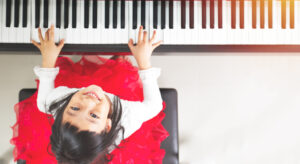As a collective of passionate music educators specializing in private lessons for young beginners, we understand the pivotal role that selecting the right piano plays in a child’s musical journey. Drawing from our extensive experience, we’ve crafted this guide to assist parents in making informed decisions that align with their child’s needs and aspirations.
🎹 Choosing the Right Piano for Your Child’s Lessons: Insights from Seasoned Music Teachers
1. Digital vs. Acoustic: Understanding the Basics
Digital Pianos
Ideal for beginners, digital pianos offer affordability, portability, and features like volume control and headphone compatibility. They require no tuning and often come with built-in metronomes and recording capabilities, enhancing the practice experience. However, it’s crucial to select models with weighted keys to mimic the touch of an acoustic piano, aiding in developing proper finger strength and technique. Lessons In Your Home+2 Lessons In Your Home+2Lessons In Your Home+2 Lessons In Your Home Lessons In Your Home
Acoustic Pianos
While they demand more space and maintenance, acoustic pianos provide a rich, authentic sound and touch that can inspire and motivate young learners. They are a long-term investment, often appreciated by students as they advance in their musical studies.Lessons In Your Home
2. Key Considerations for Beginners
-
Weighted Keys: Essential for developing finger strength and dynamic control.
-
Full 88 Keys: Allows students to explore the complete range of piano repertoire as they progress.
-
Touch Sensitivity: Enables expression through varying volume based on how hard or soft keys are pressed.Lessons In Your Home
Starting with a piano that incorporates these features ensures that students build a solid foundation, making transitions to more advanced pieces seamless.Teaching Children Music+1Lessons In Your Home+1
3. Budget and Space Constraints
We recognize that every family has unique circumstances. Digital pianos are often more budget-friendly and space-efficient, making them suitable for households with limited room. Acoustic pianos, while more expensive and space-consuming, can be worthwhile investments for families committed to long-term musical education.Lessons In Your Home+3Lessons In Your Home+3Lessons In Your Home+3
4. Our Recommendations
For families starting their child’s musical journey, we often recommend:Lessons In Your Home
-
Digital Pianos: Models like the Yamaha P-45 or Casio Privia PX-160, which offer weighted keys and realistic touch sensitivity.
-
Acoustic Pianos: Considering reputable brands like Yamaha or Kawai, known for their durability and quality sound.
It’s beneficial to consult with your child’s music teacher before making a purchase, as they can provide personalized recommendations based on your child’s specific needs and goals.
🔑 Quick Reference Guide
| Feature | Digital Piano | Acoustic Piano |
|---|---|---|
| Portability | Lightweight and easy to move | Heavy and stationary |
| Maintenance | Minimal; no tuning required | Regular tuning and maintenance needed |
| Sound Quality | Varies; high-quality models are better | Rich, authentic sound |
| Cost | Generally more affordable | Higher initial investment |
| Key Action | Weighted keys simulate acoustic feel | Natural hammer action |
